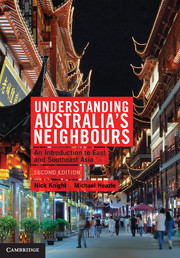Book contents
- Frontmatter
- Contents
- List of Maps
- Acronyms and abbreviations
- Acknowledgments
- Maps
- Introduction
- 1 The idea of ‘Asia’
- 2 Tradition and modernity in East and Southeast Asia
- 3 Tradition and modernity in East and Southeast Asia
- 4 Colonialism in East and Southeast Asia
- 5 Nationalism and revolution in East and Southeast Asia
- 6 Nations and nation-building in East and Southeast Asia
- 7 International politics and East and Southeast Asia
- 8 Economic growth in East and Southeast Asia
- 9 Democracy, human rights and development
- 10 Globalisation and East and Southeast Asia
- 11 China–Japan relations and US power in the twenty-first century
- 12 Australia in Asia, ‘Asia’ in Australia
- Bibliography
- Index
- References
10 - Globalisation and East and Southeast Asia
(with Daniel Halvorson)
Published online by Cambridge University Press: 05 June 2012
- Frontmatter
- Contents
- List of Maps
- Acronyms and abbreviations
- Acknowledgments
- Maps
- Introduction
- 1 The idea of ‘Asia’
- 2 Tradition and modernity in East and Southeast Asia
- 3 Tradition and modernity in East and Southeast Asia
- 4 Colonialism in East and Southeast Asia
- 5 Nationalism and revolution in East and Southeast Asia
- 6 Nations and nation-building in East and Southeast Asia
- 7 International politics and East and Southeast Asia
- 8 Economic growth in East and Southeast Asia
- 9 Democracy, human rights and development
- 10 Globalisation and East and Southeast Asia
- 11 China–Japan relations and US power in the twenty-first century
- 12 Australia in Asia, ‘Asia’ in Australia
- Bibliography
- Index
- References
Summary
EAST AND SOUTHEAST ASIA cannot be studied in isolation, as though separated from international forces. European colonialism, while sporadic and uneven, cumulatively exerted a profound impact on the region. While local histories remained important, colonialism brought with it new forms of economic production and exchange, as well as new forms of political organisation. It was via the medium of colonialism that the industrial revolution and capitalism were exported from Europe. Colonialism also brought, from the beginning of the nineteenth century, the ideology of nationalism and the concept of the nation-state. These European imports had a dramatic influence on the people of East and Southeast Asia. Their lives were profoundly altered by their incorporation into a world increasingly interrelated through the mechanism of international markets and the logic of a world dominated by states.
Ways of living altered as the external world progressively intruded; with it came a changed consciousness. No longer was the world limited to the village or township, for the boundaries that had defined the geography of local community were now breached and the certainties of traditional existence challenged. This made possible a shift to a spatial vision in which one's place and community were linked to other places, both near and far, and in which for the first time the world could be imagined as a whole. Imagining the world in turn suggested the possibility of being part of it, interacting with it, being mobile in it, learning about it and, importantly, adapting aspects of it into local cultures.
- Type
- Chapter
- Information
- Understanding Australia's NeighboursAn Introduction to East and Southeast Asia, pp. 179 - 198Publisher: Cambridge University PressPrint publication year: 2011

